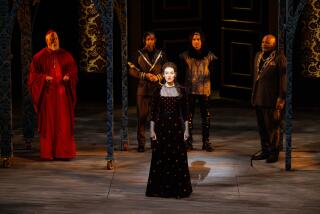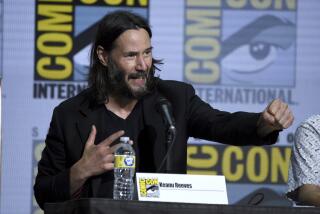A familiar story in a new universe
REWRITING a famous story from a different character’s point of view has become common enough that the results constitute a genre of their own. John Gardner saw “Beowulf” through the monster’s eyes in “Grendel”; Jean Rhys’ “Wide Sargasso Sea” excavated the life of Jane Eyre’s “madwoman in the attic”; while Tom Stoppard’s play “Rosencrantz and Guildenstern Are Dead” infused life into a pair of tertiary players in “Hamlet.” It’s the literary equivalent of those particularly potent cover versions that forever change the way you hear the original. (Think of Kirsty MacColl giving us the woman’s side of the story when she takes on Billy Bragg’s song “A New England.”)
Rarer are books by the same author in which a sequence of events gets the “Rashomon” treatment. A decade after “Mrs. Bridge” (1959), Evan S. Connell revisited the marriage depicted in that book with “Mr. Bridge.” In 1936, Harry Stephen Keeler sprung upon an unsuspecting public not one but two massive “dossier” murder mysteries, “The Marceau Case” and “X. Jones -- Of Scotland Yard”; starting from the same set of clues, the books’ respective detectives come to radically different conclusions as to the culprit. (Clearly the bizarre setup -- man dead on a mown lawn, no trace of implicating footprints -- inspired him: the case comes up three more times in his oeuvre, each time with a fresh solution.) And Joe Haldeman’s 1975 novel “The Forever War,” about the fast-forwarded, century-spanning military career of William Mandella, and its 2006 coda “A Separate War,” which gives his wife Marygay’s account of her years apart from her him.
Haldeman’s work is a precursor to John Scalzi’s “Old Man’s War” novels, the most recent of which, “Zoe’s Tale” (Tor: 336 pp., $24.95), reworks its 2007 predecessor, “The Last Colony.” “Old Man’s War,” Scalzi’s debut (and eponymous series starter), drew comparisons to Haldeman’s classic, for speculations on the high-tech wizardry and strange ironies of far-future warfare. The titular fogey is widower and former ad copywriter John Perry (best known for the tire-selling motto, “Sometimes you just gotta hit the road”), who at age 75 enlists with the Colonial Defense Forces in exchange for a souped-up, better-than-youthful body. Perry figures his days are numbered (the CDF mortality rate is perilously high), but he and his septuagenarian comrades prefer to go out with a bang, not a whimper. Earth holds little except loneliness, dotage, the body’s decay.
To his surprise, Perry discovers that he has a talent for interstellar soldiering, and the resulting story is fast-paced, imaginative, absurd and heartfelt. Perry’s voice is appropriately complex for someone both so young and so old -- worldly wise yet attuned to the wonders and myriad ironies of the weird new life he’s been granted. (The scene in which Perry sees his worn-out husk through the eyes of his buffed new bod is pure “Dorian Gray.”) A love story masquerading as a combat novel, or maybe the other way around, “Old Man’s War” is a fully formed work of art, satisfying on multiple levels.
No wonder Scalzi would want to linger in the universe he’s created. For the follow-up, “The Ghost Brigades” (the title refers to troops generated from the DNA of the dead -- including Perry’s late wife), he gave Perry’s voice a rest; it’s told in the third person. Perry, now in his 80s, returned to narrate 2007’s “The Last Colony,” in which he and his once and future wife Jane Sagan (it’s complicated) spearhead a colonial venture that turns out to be an elaborate trap (it’s also complicated). The ending is right out of “The Forever War” -- or do I mean “Hannah and Her Sisters”?
“Zoe’s Tale” recasts the narrative of “The Last Colony” in the voice of John and Jane’s (adopted) daughter. Sarcastic, wise-cracking, morally responsive and smart, Zoe sounds a lot like Ellen Page’s character in the film “Juno,” and it’s possible that your response to that celluloid teen might indicate whether this book is for you. “Tale” is a misnomer, suggesting a simple moral narrative; a touch above 300 pages, “Zoe’s Tale” is a grab bag of banter, puppy love, high-stakes standoffs, alien species and PDA fetishism. Zoe is not just the child of two respected fighters, but the biological child of a disgraced scientist who gave consciousness to the fearsome, hermaphroditic extraterrestrials known as the Obin. Given her lineage, two Obin -- Hickory and Dickory -- are her constant bodyguards; not only that, her life is an open book to the entire Obin race, who are formidably logical but still lack nuance. Hence they study her, protect her and even worship her.
In one sense, given its rejection of pacifism (a peacenik politician-turned-grunt meets a gruesome end), “Old Man’s War” nods less to “The Forever War” than to Robert A. Heinlein’s 1959 “Starship Troopers,” which set the militaristic-SF template (which Haldeman, in turn, would tweak, post-Vietnam War). “Zoe’s Tale” nods to a different strain of Heinleiniana -- his still-readable juvenile SF, books like “Farmer in the Sky” (1950) and “Podkayne of Mars” (1963). (John Varley’s recent “Rolling Thunder” is similarly influenced, with a young female protagonist who’s actually named Podkayne, after “a novel from the last century that I’ve never read.”) Scalzi’s novels use the sturdiest of earlier models to forge something vigorous and new.
“Zoe’s Tale” gets points for chutzpah: Not every author would take a combat-cum-mortality rumination, spin it out into a vast space opera, and then cap it all off with a young adult novel that repeats, in counterpoint, a previous episode. The complicated back story to this book is three volumes deep, and Scalzi telegraphs this information as smoothly as he can; still, the many explicatory patches are hard to digest and are at odds with the otherwise smooth, dialogue-driven narrative. This is not the ideal place to enter Scalzi’s world. A similar thing could be said of the “ Harry Potter” series -- it would be, say, unwise to plunge first into “The Goblet of Fire” -- but Rowling’s titles are written in a single coherent voice. Based on what’s here, it’s hard to imagine a young reader grasping, for example, why creatures on the planet are called “werewolves” even though we never see them in human form, or clearly negotiating the adversarial relationship between the Consu and the CDF. To have our hypothetical reader turn to “Old Man’s War” would probably confuse her even more.
In “Old Man’s War,” one of Perry’s friends explains how troopships cover the unimaginable distances not by propelling themselves through space, but by simply opening a door into a whole different universe. This means that all of them have left behind a litter of old realities. “Universes are continually being created from branching possibilities,” he explains. Even if “Zoe’s Tale” doesn’t entirely hold together as a novel, its existence supports this multiversal model. It’s just one of the myriad realities that hovered into existence at the first keystroke of Scalzi’s grand fictional project.
Ed Park’s Astral Weeks column appears monthly at latimes.com/books. He is an editor of “The Believer” and the author of the novel “Personal Days.” He blogs at The Dizzies.
More to Read
Sign up for The Wild
We’ll help you find the best places to hike, bike and run, as well as the perfect silent spots for meditation and yoga.
You may occasionally receive promotional content from the Los Angeles Times.










